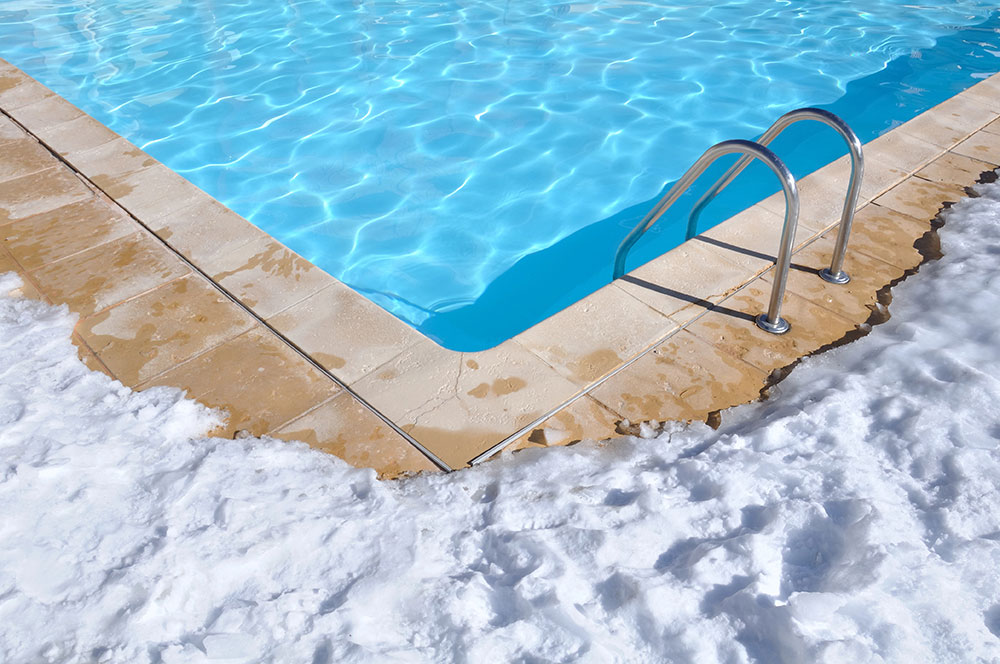As winter approaches, it’s essential to properly prepare your pool to ensure it remains in good condition throughout the colder months. Winterizing your pool involves more than just covering it; it requires specific chemicals to maintain water quality and protect the pool’s surfaces and equipment. Here’s a detailed guide on the necessary chemicals to use and why they are important:
1. Pool Shock
Before closing your pool, it’s crucial to sanitize the water thoroughly. A chlorine shock treatment should be applied 4-5 days before closing to eliminate any bacteria, algae, or organic contaminants. Pool shock raises the chlorine level temporarily, providing a deep clean that helps maintain water clarity and safety throughout the winter. Ensure that the chlorine level returns to a normal range before proceeding with other winterizing steps.
2. pH Balancer
Maintaining the proper pH level is essential for protecting your pool surfaces and equipment. The ideal pH range for a pool is 7.2-7.6. Before adding winterizing chemicals, adjust the pH using a pH increaser or decreaser as needed. Keeping the pH within this range prevents corrosion and scaling, ensuring that the pool’s surface and equipment are not damaged during the winter months.
3. Alkalinity Increaser
Total alkalinity acts as a buffer for the pH level, preventing rapid changes. The recommended total alkalinity range for a pool is 80-120 ppm (parts per million). Use an alkalinity increaser to bring the levels within this range if needed. Proper alkalinity helps stabilize the pH, reducing the risk of damage to the pool surfaces and maintaining balanced water chemistry.
4. Calcium Hardness Increaser
Calcium hardness refers to the amount of dissolved calcium in the water. The ideal range is 200-400 ppm. If the calcium hardness is too low, the water can become corrosive, damaging the pool’s surface and equipment. Conversely, high calcium hardness can lead to scaling. Adjusting the calcium hardness to the appropriate level helps protect your pool’s integrity during the winter.
5. Winter Algaecide
Algae can thrive in cold temperatures, so adding a winter algaecide on the day you close the pool is crucial. This chemical prevents algae growth during the winter months, keeping the water clear and reducing the workload when reopening the pool in the spring. Make sure to choose a non-foaming algaecide to avoid any unwanted residue.
6. Pool Antifreeze
In areas where freezing temperatures are common, pool antifreeze is an essential addition to the winterization process. It prevents any residual water in the plumbing lines from freezing and expanding, which could cause cracks and damage. Add pool antifreeze to the plumbing lines after blowing them out to provide an extra layer of protection.
Optional Additions:
• Stain and Scale Preventer: This chemical helps prevent metal staining and mineral buildup, which can occur if metals and minerals are present in the water. It is especially useful for pools with hard water.
• Enzyme Treatment: If you have a mesh cover that allows debris to enter the pool, an enzyme treatment can help break down organic matter, reducing the likelihood of stains and waterline buildup.
• Slow-Release Winter Floater: This device gradually releases chemicals into the pool over the winter months, helping maintain water balance and preventing algae growth. It is an easy and effective way to manage pool chemistry during the offseason.
FAQs
1. Why is it important to use a pool shock before closing the pool for winter?
Answer: Pool shock sanitizes the water by eliminating bacteria, algae, and organic contaminants. This deep cleaning helps maintain water clarity and quality throughout the winter months, preventing potential issues when reopening the pool in the spring.
2. What happens if the pH level is not balanced before adding winterizing chemicals?
Answer: An unbalanced pH can cause corrosion or scaling, damaging the pool’s surfaces and equipment. It can also affect the effectiveness of other winterizing chemicals. Maintaining a pH level of 7.2-7.6 is crucial for protecting the pool and ensuring chemical stability.
3. Is pool antifreeze necessary if the pool water is drained below the skimmer?
Answer: Even if the water level is lowered, there can still be residual water in the plumbing lines. Pool antifreeze is essential in preventing this water from freezing and expanding, which could cause cracks and damage. It provides extra protection for the plumbing system.
4. Can I use regular household antifreeze for my pool?
Answer: No, you should only use pool-specific antifreeze. Regular household antifreeze contains chemicals that can be harmful to the pool’s equipment and plumbing. Pool antifreeze is specially formulated to be safe for use in swimming pools.
5. What is the purpose of a slow-release winter floater?
Answer: A slow-release winter floater gradually releases chemicals into the pool water throughout the winter months. This helps maintain water balance and prevents algae growth, ensuring that the pool remains in good condition until it is reopened in the spring.
Conclusion
Properly winterizing your pool with the right chemicals is essential to protect it from the harsh winter conditions. By balancing your water chemistry and adding the necessary chemicals, you can prevent damage, maintain water quality, and make reopening your pool in the spring a breeze. Following these steps will ensure your pool remains in great condition, ready for a new season of enjoyment.

